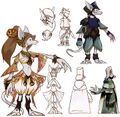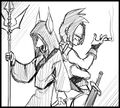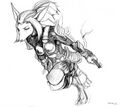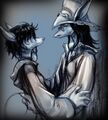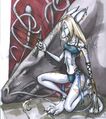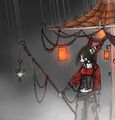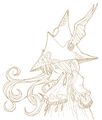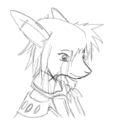Burmecian: Difference between revisions
1d4chan>Nubnuber (G0od thing the uploader used a consistent naming scheme for these) |
m (38 revisions imported) |
||
| (5 intermediate revisions by 3 users not shown) | |||
| Line 3: | Line 3: | ||
[[Image:Burmecian17.jpg|thumb|Few Burmecians remain in the Unified Setting, existing in quiet desperation alone amongst the draconian ruins.]] | [[Image:Burmecian17.jpg|thumb|Few Burmecians remain in the Unified Setting, existing in quiet desperation alone amongst the draconian ruins.]] | ||
'''Burmecians''' are a race from the game Final Fantasy 9. They are being statted up and references to the game series they're from is being put into the [[Unified Setting for /tg/]], given how much furries apparently love this race of people and Freya in particular. | '''Burmecians''' are a race of benevolent [[ratfolk]] from the game [[Final Fantasy]] IX (that's Final Fantasy 9 for you who don't read Roman numerals). They are being statted up and references to the game series they're from is being put into the [[Unified Setting for /tg/]], given how much furries apparently love this race of people and Freya in particular. | ||
==In /v/== | |||
Burmecians, sadly, are one of Final Fantasy's large list of one-game races, being a species of [[ratfolk]] who are only mentioned in [[Final Fantasy]] IX. They inhabit the kingdom of Burmecia, a territory also known as the Realm of Eternal Rain; situated in the northwestern region of the Mist Continent on the world of Gaia, its position in the lowlands means the magical Mists constantly fill the sky, resulting in an endless deluge that washes over the city at all times. This may be at least partially responsible for one of the Burmecians' most notable traits; they are almost completely hairless. Their other most notable trait, the powerful legs that make them such adept jumpers, suggest they may have originated as jerboa or kangaroo rat-like rodents. | |||
The burmecian culture is ancient, established over 1300 years before the present. They are known as the masters of the fighting style of "Dragon Knights", a variant of the job seen in other FF titles as the "Dragoon". This is a polearm-wielding warrior who specializes in leaping attacks, despite being surprisingly heavily armored, and also learns a number of mystical weapon's techniques that are not considered magic in-game. Around 1300 years ago, a civil war led to a fraction of the burmecian population fleeing west to the Vube Desert; here, they settled in a gigantic, magical tree and used powerful spells to erect a permanent sandstorm to ward off outsiders, founding the splinter-nation of Cleyra. | |||
Despite this, burmecians remained a warlike culture, engaging in battles both with rival powers and amongst themselves; contact with Cleyra was formally severed over yet another burmecian civil war a century before the game, whilst a war was fought against the human-ruled nation of Alexandria about 30-40 years before the present of the game. | |||
In contrast to their warlike cousins, the otherwise identical Cleyrans are a peaceful, spiritual people who revere the giant tree they live in and the sandstorm that shields it as divine entities. | |||
Both branches of the ratfolk race have a strong cultural emphasis on dancing and agility. | |||
{{spoilers}} | |||
During the course of Final Fantasy IX, first Burmecia and then Cleyra are attacked by the armies of Alexandria and utterly destroyed, killing much of the population of Burmecians and Cleyrans and scattering the survivors far and wide. | |||
==Final Fantasy D20== | |||
The Final Fantasy D20 project, an attempt to adapt the FF multiverse into a tabletop gaming setting using the [[Pathfinder]] system, naturally includes Burmecians as a playable race. | |||
https://www.finalfantasyd20.com/races/base-races/burmecian/ | |||
==Unified Setting Description== | ==Unified Setting Description== | ||
| Line 83: | Line 102: | ||
Burmecian41.jpg | Burmecian41.jpg | ||
Burmecian42.jpg | Burmecian42.jpg | ||
Burmecian33.png | |||
Burmecian6.gif | |||
Burmecian26.gif | |||
Burmecian36.png | |||
Burmecian15.png | |||
</gallery> | </gallery> | ||
[[Category:Furry]] | [[Category:Furry]] | ||
[[Category:Races]] | [[Category:Races]] | ||
Latest revision as of 09:43, 20 June 2023

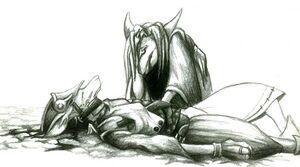
Burmecians are a race of benevolent ratfolk from the game Final Fantasy IX (that's Final Fantasy 9 for you who don't read Roman numerals). They are being statted up and references to the game series they're from is being put into the Unified Setting for /tg/, given how much furries apparently love this race of people and Freya in particular.
In /v/[edit]
Burmecians, sadly, are one of Final Fantasy's large list of one-game races, being a species of ratfolk who are only mentioned in Final Fantasy IX. They inhabit the kingdom of Burmecia, a territory also known as the Realm of Eternal Rain; situated in the northwestern region of the Mist Continent on the world of Gaia, its position in the lowlands means the magical Mists constantly fill the sky, resulting in an endless deluge that washes over the city at all times. This may be at least partially responsible for one of the Burmecians' most notable traits; they are almost completely hairless. Their other most notable trait, the powerful legs that make them such adept jumpers, suggest they may have originated as jerboa or kangaroo rat-like rodents.
The burmecian culture is ancient, established over 1300 years before the present. They are known as the masters of the fighting style of "Dragon Knights", a variant of the job seen in other FF titles as the "Dragoon". This is a polearm-wielding warrior who specializes in leaping attacks, despite being surprisingly heavily armored, and also learns a number of mystical weapon's techniques that are not considered magic in-game. Around 1300 years ago, a civil war led to a fraction of the burmecian population fleeing west to the Vube Desert; here, they settled in a gigantic, magical tree and used powerful spells to erect a permanent sandstorm to ward off outsiders, founding the splinter-nation of Cleyra.
Despite this, burmecians remained a warlike culture, engaging in battles both with rival powers and amongst themselves; contact with Cleyra was formally severed over yet another burmecian civil war a century before the game, whilst a war was fought against the human-ruled nation of Alexandria about 30-40 years before the present of the game.
In contrast to their warlike cousins, the otherwise identical Cleyrans are a peaceful, spiritual people who revere the giant tree they live in and the sandstorm that shields it as divine entities.
Both branches of the ratfolk race have a strong cultural emphasis on dancing and agility.
During the course of Final Fantasy IX, first Burmecia and then Cleyra are attacked by the armies of Alexandria and utterly destroyed, killing much of the population of Burmecians and Cleyrans and scattering the survivors far and wide.
Final Fantasy D20[edit]
The Final Fantasy D20 project, an attempt to adapt the FF multiverse into a tabletop gaming setting using the Pathfinder system, naturally includes Burmecians as a playable race.
https://www.finalfantasyd20.com/races/base-races/burmecian/
Unified Setting Description[edit]
Burmecians are no longer canon US! Instead, see Faestir
Burmecians are a noble but desperate race, poised on the cusp of extinction. Once divided into two species, now they stand under a mixed heritage of chivalrous war and humble artistry. Burmecians typically range from 5 to 7 feet tall and 90-120 pounds. Their short fur is grey, but their heads are topped with hair that ranges between brown, grey and blonde, and their eyes come in shades of grey, blue and green. Their clothing comes in all manner of colours, with several styles depending on profession, from heavy coats to puff-sleeved shirts to voluminous robes. Burmecians have a strong sense of history and tradition, and tend to be formal and reserved: this cool demeanor, however, conceals a pride and determination fired by their great losses, and they can be fierce and implacable enemies. They tend towards the Lawful side of the alignment spectrum. Burmecians speak Common, though they once were native speakers of Draconic. Most Burmecians encountered outside their home are Fighters.
Stats for D&D[edit]
Size: Medium
-2 Str +2 Dex +2 Wis
+4 Jump
+2 Perform: Dance, Balance
Quick Step: Whenever a Burmecian makes a 5 ft step, they may move 10 ft instead
Natural Leaper: Burmecians always count as having the needed 20 ft run up for making jumps.
Move speed: 30ft.
Favored Class: Bard or Fighter
Burmecia: the rise and fall[edit]
This is the fluff so far for the Burmecians of the unified setting.
Many thousands of years ago Bahamut created Reis, the first Burmecian ever, using his near-god-like magical powers. No one is quite sure why he did this; perhaps to prove a point, or just because he could. For whatever reason, the Burmecians still pay tribute to Bahamut as the bringer of life and creator of their race. Later, Bahamut got into a war with some other Draconian sorcerers. To help him defeat his enemies, he created an army of creatures just like Reis and blessed them with incredible powers. He called them Dragoons. The war raged for some time and eventually, Bahamut’s castle was destroyed and Bahamut disappeared.
After the war, Reis and the surviving Dragoons left the Draconians behind and travelled into the desert to the northwest. Leviathan, goddess of the rain, took pity upon them and granted them shelter from the harsh sun in the form of a never-ending rain cloud that caused the desert to blossom and grow fertile around them. She also gave Reis several hundred babies, the start of the Burmecian race. The Burmecians built up a grand city in the desert, where the rain always fell and the sun could not hurt them. The Dragoons protected them and eventually were integrated into their society as a separate caste of noble warriors. A small group of Burmecians claimed that Leviathan was an evil demon in disguise, and broke away from their society. They prayed to the god of the desert for protection and the desert led them to a great underground cavern where a city made of sandstone was waiting for them. They named the city Cleyra.
Over the centuries, the blood of the Dragoons was passed into many of the families of Burmecia. By contrast, the Dragoons themselves were becoming fewer in number with each generation, and their divine abilities faded over time.
Thousands of years later, a horde of kobolds attack the peaceful city of Cleyra, under the direction of a creature they called Tiamat. The Cleyrans resisted for a time but were eventually overwhelmed and forced to seek help from their ancestral cousins. The last handful of Dragoons managed to defeat the kobold warlocks leading the tribe to war, but not before one of them turned Cleyra to glass by the might of Tiamat's power. All but a few Dragoons perished in the war and Burmecia was ransacked by a huge kobold army. The desert became kobold territory, and the Burmecian survivors less than a thousand in number fled to the ruins of their ancient home.
Along the coast close to the ruins of Bahamut's city-palace, the survivors founded the settlement of New Burmecia in a series of natural caves. Their numbers began to swell once more, but Reis' blessing of fertility had waned greatly since the ancient times. The blood of Bahamut ran in every family, granting the Burmecians a taste of his incredible power. The last pure-blooded Dragoon passed on the secrets of his trade to a common warrior, who took it upon her young shoulders to resurrect the nigh-perished order.
New Burmecia[edit]
- Culture
New Burmecia is a very small settlement founded in a series of coastal caves north of the ancient ruins of Bahamut's castle, surrounded by dense wetland forest. It is in a relatively remote part of the world so not many know it even exists, and fewer have ever been there. The inhabitants keep mostly to themselves. Dragoons are the most likely to ever leave their homeland, questing the world in search of anything that might help Burmecia become a prosperous nation once more.
Burmecians care greatly for hats and other headgear, to the extent that not wearing one is worse than being naked in their society; the presence of other clothing being secondary to whether or not one is wearing a hat.
- Religion
As creations of the Draconian race, most of the Burmecian faith is descended from that of their precursors. However, in modern times, most of the traditional beliefs are all but forgotten. Contemporary faiths worship Bahamut, who is seen as a creator in the most literal sense, and Reis as the origin of the entire species has become a "mother goddess" figure in Burmecian culture. Very few still worship Leviathan.

